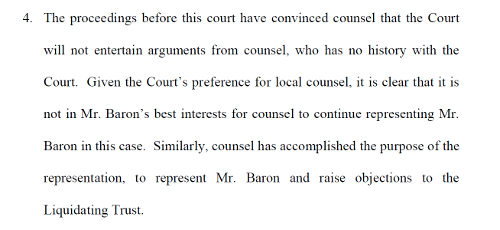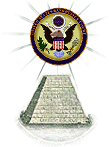|
ONDOVA LIMITED COMPANY
What we have here is a Motion To Withdraw, a lawyer asking the Judge for permission to Quit. But it doesn't take a Shakespearean Scholar to see some seriously evil treachery afoot.
Sometimes, less is more. BankruptcyMisconduct doesn't really have to say too much on this peculiar filing. Anyone who makes a living off of the "business of bankruptcy" can understand very quickly that the Judge on this case, and the dirtbags who've grabbed the reins, are treating lady justice like Menendez would a Dominican underaged hooker.
We'll just entertain you with a couple of clippings from this Withdrawal Motion, but if you're a scholarship candidate, concerned citizen, political candidate, academic, regulator, Legislator, or a Federal Special Prosecutor then we really suggest that you download the entire document here for free. In fact, you really ought to read up on this outrageous abuse of power, under Color Of Law:
It is unprecedented to interrupt a witness’ testimony for an ex parte
hearing and conduct an ex parte hearing. page 7
So without much further ado, let begin our coverage of Ondova with some liberal quoting of a motion filed by counsel in the matter. The motion may at first pass appear to be an instance of ACPOC Syndrome, but read on. There are quite a few more layers within the Ondova Onion.

First of all, you might want to download the entire Withdrawal Motion for free now, so that you can read along. The above paragraph number 4 was from Page 2. (But there is much more to read!) Ok, so we see that this guy Jeffrey Baron had an attorney appointed for him, Stephen Cochell. But now, Mr. Cochell is asking to be relieved from the continuing obligation to represent Jeffrey Baron. Why would a lawyer seek to get rid of a client - don't lawyers want clients? Well, how about this little gem from the motion:
The Court’s comment to Mr. McPete was also deeply disturbing
We've read our share of motions to withdraw as counsel, like in WorldCom. But what is refreshing here is that counsel is being honest as to why he seeks to withdraw, and the finger is pointing squarely at a judge who is not doing his official job.
Amazing. Blatant. Daring.
There is just sooo much content in this filing. We can't fit it all on one page. So we'll just copy the buck of it below. It's in text format with a formatting as close as possible to the original, with a little emphasis added. We'll add more pages to ONDOVA in order to give our analysis to the wildness below. But we don't want to delay getting this outrageousness "out there" for our loyal readers to peruse. Which these days include the U.S. House, Senate, FBI, and DOJ, a robust selection of BigLaw firms, and neo-subtle outsourced biz-intel gathering operations.
Yeah, why don't ya'll start reading this obviousness cause we're gonna be following this case like it was the second coming of Dewey LeBoeuf.
So Stephen, why don't you just tell us "Why" you want to withdraw:
( actual excerpt from the motion. ... No, really! )
____________________________________________________
GOOD CAUSE EXISTS FOR WITHDRAWAL AS COUNSEL
6. Good cause exists for withdrawal where, as here, the Court has clearly
denied motions to compel discovery and other motions outlining discovery
Emergency Motion to Withdraw as Counsel and or Continuance Page 3
abuse based on her experience and history with counsel, who have
appeared before her on hundreds of occasions whereas the Court has no
experience with the undersigned counsel, who is not a bankruptcy lawyer
and who practices in Houston. The Court stated, in pertinent part, that no
one “ever accused them of these things in decades, and you’re suddenly
making incredibly damaging, demeaning, besmirching allegations.”
12/3/12 Hearing Tr. At 52. The Court further stated that the allegations
were “careless.” Id.
a. On the contrary, counsel offered to provide evidence to Court
regarding excluded bidders at the Confirmation Hearing if the Court
allowed him a brief continuance, and offered the Court a declaration of
a witness after the hearing, but prior to the Court’s ruling. The Court
was apparently unwilling to accept the representations of counsel as an
officer of the Court.
b. Similarly, the Court imposed discovery conditions that effectively
excluded counsel for Baron and his expert witnesses from receiving
“Attorneys Eyes Only” information. This action was unprecedented,
without good cause, and was a comment on the Court’s perception of
counsel’s lack of credibility as an officer of the Court. The evidence at
hearing from Dr. Lindenthal and Mr. Baron, as well as the recently
disclosed email of Eric Rice underscored the importance of electronic
evidence in conducting due diligence in valuing domain names.
Emergency Motion to Withdraw as Counsel and or Continuance Page 4
c. Once the Declaration of Eli Pearlman was presented, the United States
Trustee believed there was evidence to support the allegations.
Counsel filed motions to compel, a Show Cause and other motions to
obtain the Court’s attention that the very court-ordered evidence being
withheld by the Receiver might reveal deficiencies in the process
requiring discovery.
d. The Court’s comment to Mr. McPete was also deeply disturbing:
MR. McPETE: And so I hear Ms. Lambert and mr. Fine say,
well, this reqally is sort of non-harm/no-foul because they’re
not interested in bidding, but I’m not sure that’s entirely the
case. This I think would have been very relevant for the Court
to have heard about –
THE COURT: That’s not –
MR. McPETE: --during the confirmation process.
THE COURT: That’s not exactly what Mr. Fine said. He said
they were not so much interested in the cybersquatting nature
of the portfolio.
MR. McPETE: I—
THE COURT: That he had many, many conversations with
them, and after that, you know, that sounded like the reason
that they were not interested in going forward.
Emergency Motion to Withdraw as Counsel and or Continuance Page 5
MR. McPETE: I heard him say that, but that’s not borne out
by the email. And the e-mail we have in writing, we can see
what the gentleman said.
THE COURT: So I should accept the e-mail of someone I’ve
never heard of versus an officer of this Court?
MR. McPETE: I’m just saying, this we have in writing. We
only have Mr. Fine’s representations on what was said on a call
in which I didn’t participate, I didn’t even know about it.
THE COURT: Okay. Right now, I’m giving Mr. Fine a whole
lot more credence than you. Okay? This is one of those
situations where reputation matters.
MR. McPETE: I’m not sure why --
THE COURT: Okay?
MR. McPETE: --I would have a bad reputation, Your Honor,
I’m not Mr. Baron. I’m not Mr. Baron’s counsel.
12/3/12 Hearing Tr. At 39-40. (emphasis supplied)
e. Simply stated, it appears that the reason for the Court’s refusal to
compel discovery appears to be based on the Court’s experience with
counsel and concern for the reputations of local counsel, and a lack of
experience and lack of trust in counsel for Baron as an attorney and
officer of the Court. Thus, it is in Mr. Baron’s best interest that
counsel withdraw and retain a local attorney whose status as an officer
of the Court will not be questioned or whose representations will be
Emergency Motion to Withdraw as Counsel and or Continuance Page 6
rejected because he has had not appeared before the court on numerous
occasions and therefore, has no reputation with the Court. Further
details are set out below.
7. During the last day of the Confirmation Hearing, the Court allowed
testimony of Stevan Lieberman, an attorney for Trans, Ltd. the “winning
bidder” to testify that his clients were good faith purchasers for value.
a. Mr. Lieberman initially refused to testify about the ownership of
Trans and its relationship with Special Jewel, the second highest
“bidder.”
b. Mr. Lieberman disclosed that he was also counsel for Special
Jewel1, and further represented Domain Group Holdings, an insider
to this transaction. This did not appear to be coincidence.
c. Counsel for Baron moved to strike his hearsay testimony but the
Court proceeded, over objection, to hold an ex parte hearing
outside the presence of all counsel, except for the United States
Trustee, who participated in the hearing.
d. Counsel for Baron requested discovery of the bidders to protect the
integrity of the bankruptcy process. The Court denied this motion.
e. Counsel for Baron filed a Motion on the appearance of impropriety
resulting form the Court’s ex parte proceeding. Without findings
or explanation, that motion was denied.
|
 CA Bar Complaint (14831)
CA Bar Complaint (14831) SONICblue - A Claims Trader's Fees Reimbursed for Alerting about Attorney Misconduct (12763)
SONICblue - A Claims Trader's Fees Reimbursed for Alerting about Attorney Misconduct (12763) Haas v. Romney 2nd Amended Complaint (12134)
Haas v. Romney 2nd Amended Complaint (12134) CA Bar **Revised** Complaint (11274)
CA Bar **Revised** Complaint (11274) SEC filings by client of PriceWaterhouseCoopers and HBD (10963)
SEC filings by client of PriceWaterhouseCoopers and HBD (10963) Doug Pick Esq. advice on Death Threats (10848)
Doug Pick Esq. advice on Death Threats (10848) Judicial Complaint against Judge Paul G. Hyman by Mary Alice Gwynn (10539)
Judicial Complaint against Judge Paul G. Hyman by Mary Alice Gwynn (10539) Shock! Peck's Lehman case colored by fraud? (10240)
Shock! Peck's Lehman case colored by fraud? (10240) SEC - so simple even a Caveman can see it! (9816)
SEC - so simple even a Caveman can see it! (9816) CABAURHBDreq1 (9573)
CABAURHBDreq1 (9573)


